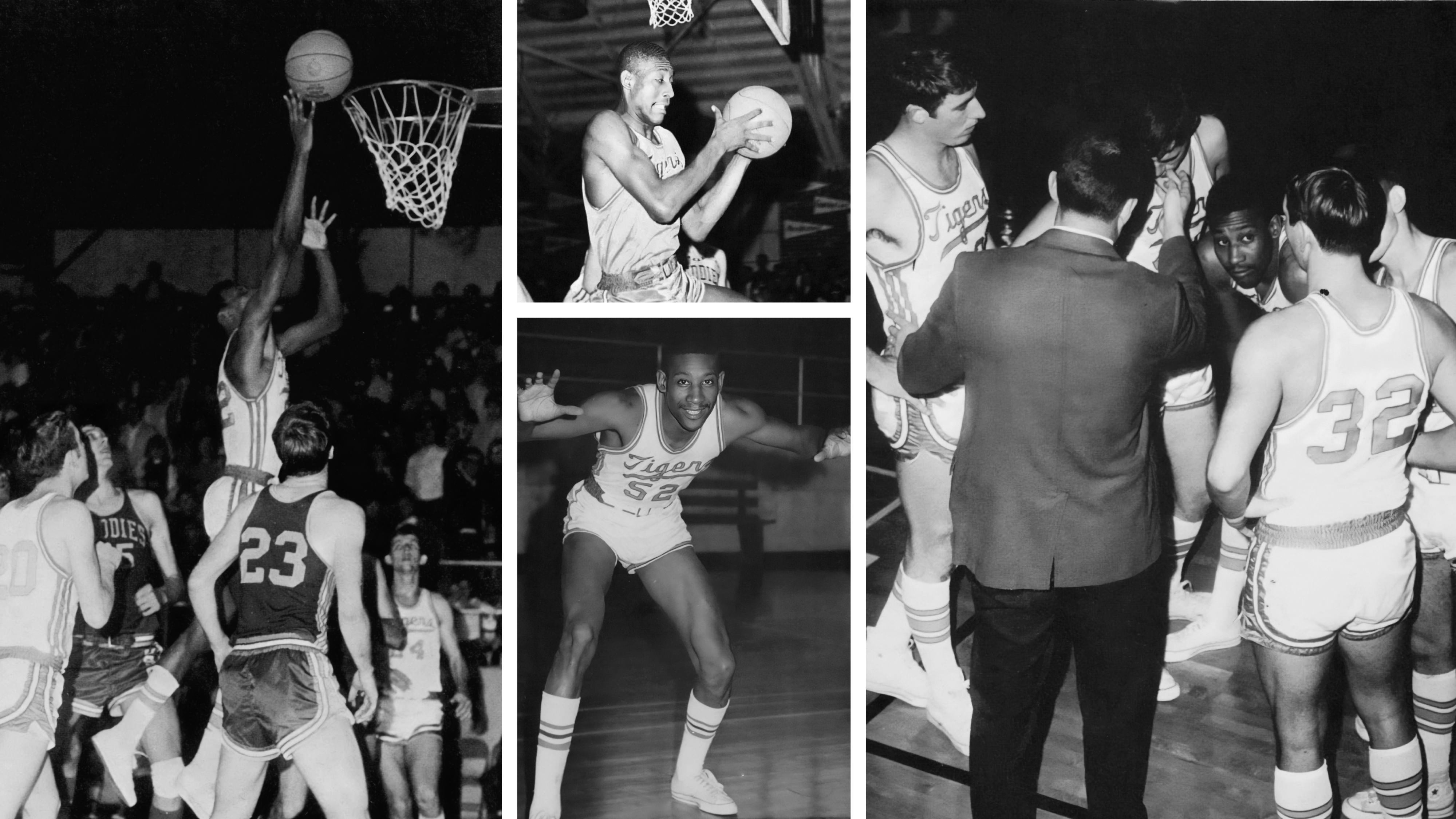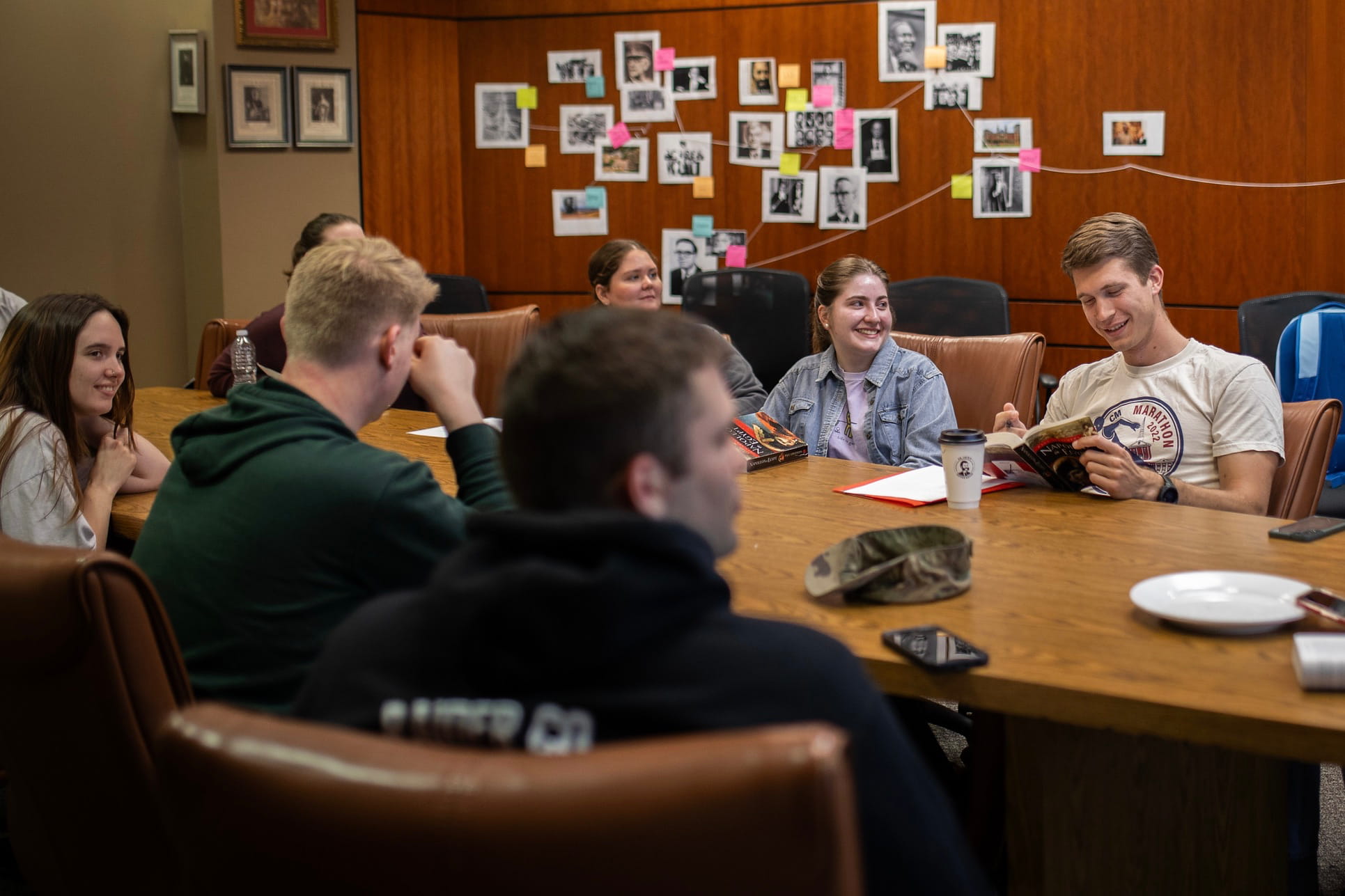Ouachita panel discussion highlights King’s life and legacy
January 22, 2010 - Hannah Holmes
Almost 50 years ago, at the Lincoln Memorial, Dr. Martin Luther King, Jr., uttered those timeless words: “I have a dream.” He spoke with a powerful rhetoric that flowed naturally, yet emphatically.
King’s delivery of the celebrated “I have a dream” speech was a definitive event in
the civil rights movement and a major turning point, not only in United States history,
but in world history.
“I can remember hearing the ‘I have a dream speech’ when I was young,” said Dr. Tom
Auffenberg, chair of OBU’s department of history. King “was a spellbinding speaker,
a very highly charismatic individual who galvanized a lot of people to fighting injustice.”
On Dr. Martin Luther King, Jr., Day on Jan. 18, Ouachita students, faculty, staff
and members of the Arkadelphia community gathered in McBeth Recital Hall for a common
purpose: to commemorate this great American hero by participating in a panel discussion.
Dr. Hal Bass, dean of the Sutton School of Social Sciences, moderated the panel, which
addressed King's life and legacy.
"It seems to me we are providing symbolic support for the values [King] embraced, values like social justice, human rights, equality, values that very much resonate
within our mission as a Christian university," Bass said. "I think in a sense we are
also paying a little penance for the societal scent of racism that has so bedeviled
our country through the centuries."
Panelists included Auffenberg; Philip Williamson, a philosophy, political science
and Christian studies triple major who also serves as senior class president; Stephen
Johnson, an accounting and business administration double major and Student Senate
president; Kendra Pruitt, a business administration major; and Connie Nelson,executive
director of the Arkadelphia Area Chamber of Commerce.
Panelists and audience members alike spent time in remembrance of King and posed
intriguing questions about the nature of King’s influence and the vestiges of that
influence in modern society.
“His crusade for civil rights, combined with his non-violent approach, radically reshaped
life for millions of Americans,” said Williamson. “It even inspired similar movements
around the world.”
Johnson, who grew up in Brazil, complemented this idea by noting that Brazilians were
also influenced by King's involvement in the American civil rights movement.
Pruitt stated that all Americans owe gratitude to King. She described how he sacrificed
his life for goals that he did not even see come to fruition, and she expressed her
personal gratitude by stating that she would not be a Ouachita student today if it
had not been for him.
Nelson expressed how King's philosophies impacted her childhood. His legacy is both
remarkable and personal to her, for she remembers attending segregated schools and
drinking from “colored” water fountains. She described how his ideas continue to shape
her actions today and how, in the same way King fought for “equality, truth and understanding,”
Americans must continue to fight, because racial division is still a detrimental aspect
of society. Racism, she explained, is not limited to tangible experience but exists
within personal perception.
Before the discussion began, Bass noted that though this was a time to celebrate progress,
it was also a time to raise difficult questions about modern society.
“Racism still exists but it is definitely better legally than it was when I was a
young person,” Auffenberg said."And the fact that we have an African-American president
demonstrates that we have come a long way from where we were generations ago."
Though progress has abounded and racism is not as readily apparent in modern America,
many African-Americans experience racism on daily basis, in the form of underhanded
comments or stereotypical assumptions.
Racism “is not necessarily institutionalized, but on a personal level some of the
attitudes and stereotypes remain,” Williamson said. “For example, my friends have
called me ‘white’ most of my life because I am articulate and intelligent. While it
was not meant to be insulting, the statement fed off of a stereotype of black males
as thugs. As my generation gets older, and even more so with our children, we will
see some of those attitudes dissipate. I do fear, however, that our racism has and
will continue to turn on Hispanics.”
Bass emphaiszed that though equality has been legalized, it is still important for
people to actively pursue a mindset that sincerely and unequivocally promotes true
values of equality.
Both Auffenberg and Bass noted the importance of how King, who had answered a call
to ministry at a young age, in a sense, "spiritualized" the civil rights movement.
"He was very committed and compassionate, very hard working, very spiritual," Auffenberg
said. "And he took the civil rights movement in a spiritual direction, which I think
was very important for its non-violence."
King was not only a political activist, charismatic genius and mover of minds who
brought Americans infinitely closer to the goal of extending equal opportunities.
He was a Christian minister, a Christ-like man who selflessly put himself in danger
for the sake of others, a man who was ultimately martyred.
“First and foremost [King] was a preacher,” Bass said. “And I think that we need to understand his life and work
within the context of the calling that he embraced. I think he was obviously an activist.
He was a very, very innovative thinker in the sense that he grasped that the non-violent
civil disobedience tactics of Thoreau and Gandhi were the appropriate way to push
for racial equality in the United States. And he was a tactical genius in that insight.
To use a phrase from Lincoln, he called forth ‘the better angels of our natures.’
I think that’s an important part of his legacy. He tried to make us live up to our
calling as Christians and also as citizens.”
By Hannah Holmes, Signal writer
You Also Might Like
Ouachita reports Spring '26 enrollment, led by 50% increase in graduate students
February 11, 2026Recent
Ouachita reports Spring '26 enrollment, led by 50% increase in graduate students
February 11, 2026



